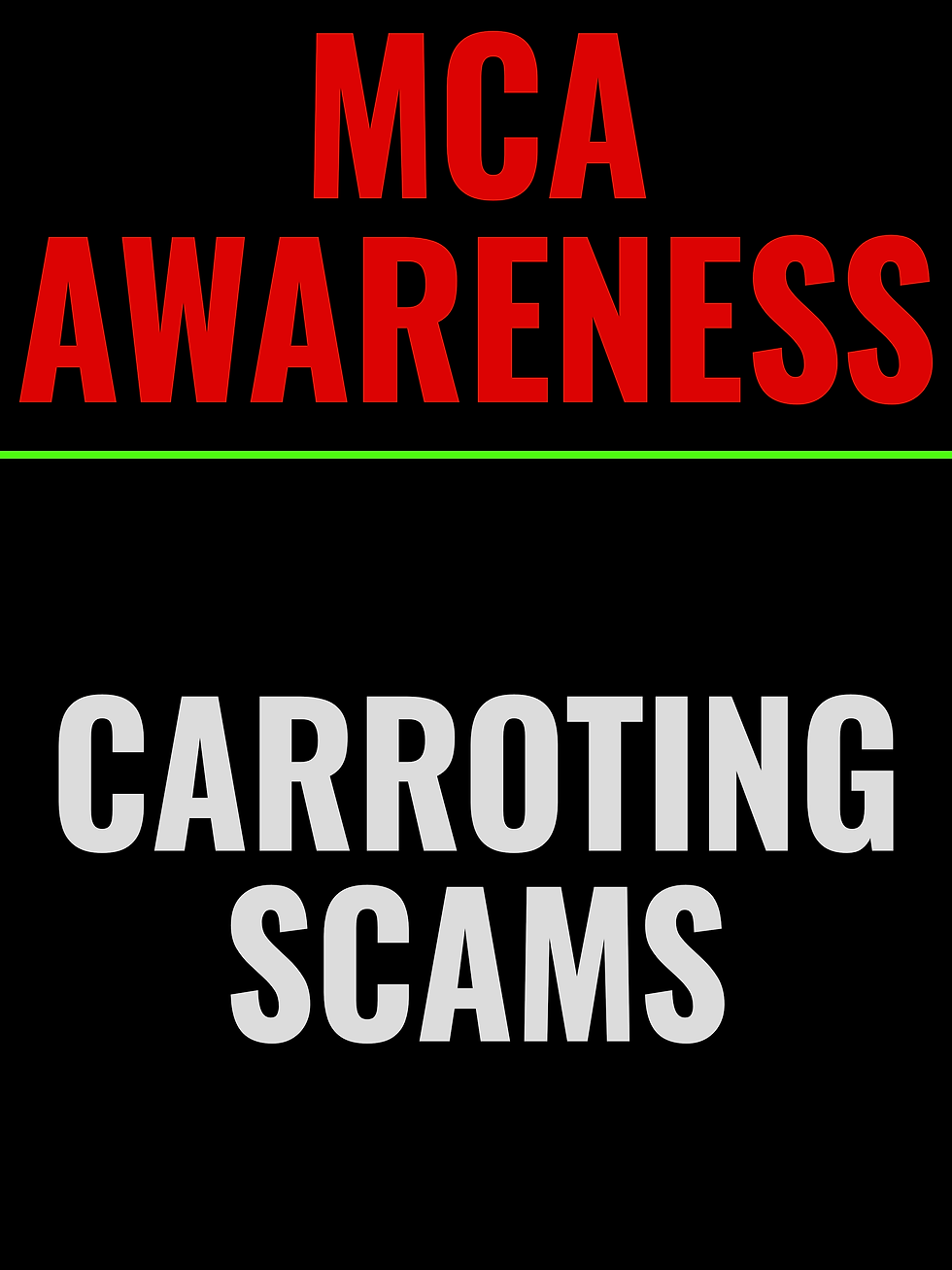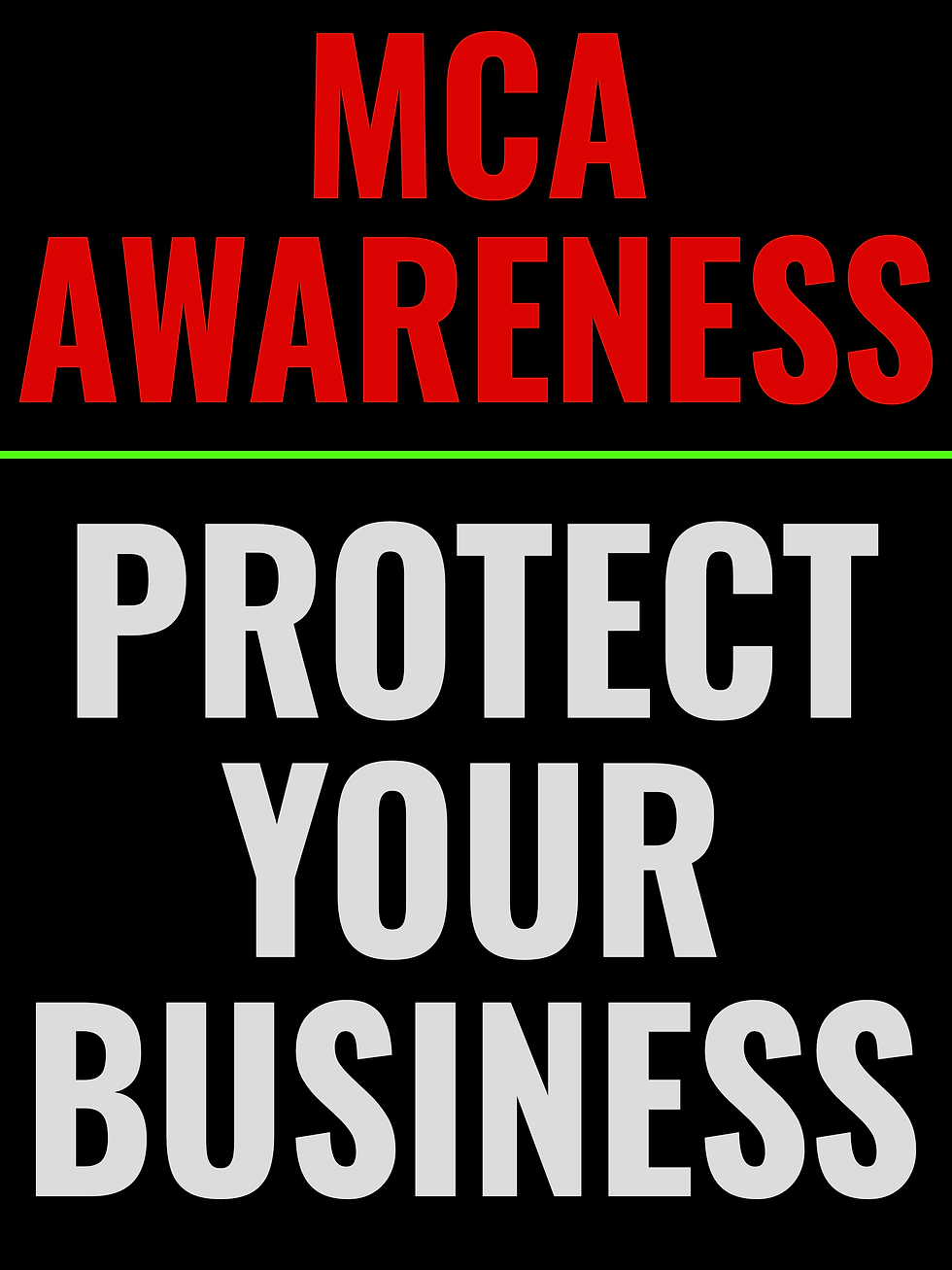Uncovering Merchant Cash Advance Fraud: A Legal Perspective
- Aug 24, 2025
- 4 min read
Updated: Sep 22, 2025
Merchant cash advances (MCAs) have become a popular financing option for small businesses. They offer quick access to cash, which can be a lifesaver for many entrepreneurs. However, with the rise in popularity comes an increase in fraudulent activities.
Understanding the legal implications of merchant cash advance fraud is crucial for business owners. This post will explore the various aspects of MCA fraud, how to identify it, and what legal steps can be taken to protect yourself.
What is a Merchant Cash Advance?
A merchant cash advance is not a traditional loan. Instead, it is a cash advance based on future credit card sales. Businesses receive a lump sum of cash upfront and repay it through a percentage of their daily credit card sales.
This can be appealing for businesses that may not qualify for traditional loans due to poor credit or lack of collateral.
The Appeal of MCAs
Quick Access to Funds: Businesses can receive cash in as little as 24 hours
Flexible Repayment: Payments are tied to sales, making it easier for businesses to manage cash flow
Less Stringent Requirements: MCAs often have fewer requirements than traditional loans
The Dark Side of Merchant Cash Advances
While MCAs can be beneficial, they also come with risks. Fraudulent practices can occur, leading to significant financial losses for businesses. Understanding these risks is essential for any business owner considering an MCA.
Common Types of MCA Fraud
Misrepresentation of Terms: Some lenders may not disclose all fees or may misrepresent the terms of the advance. This can lead to businesses paying much more than they initially expected
Predatory Lending Practices: Some lenders target vulnerable businesses, offering terms that are impossible to meet. This can trap business owners in a cycle of debt
Identity Theft: Fraudsters may use stolen identities to secure MCAs, leaving the real business owner responsible for the debt
Fake Lenders: Some individuals pose as legitimate lenders, taking advantage of desperate business owners. They may ask for upfront fees and then disappear
MCAExposed is a platfrom where you can also submit your mca fraud report.
Identifying Merchant Cash Advance Fraud
Recognizing the signs of fraud is the first step in protecting your business. Here are some red flags to watch for:
Red Flags to Watch For
Unclear Terms: If the lender is not transparent about fees or repayment terms, be cautious
Pressure Tactics: Legitimate lenders will not pressure you to sign immediately. If you feel rushed, it may be a scam
Lack of Documentation: Always ask for written agreements. If a lender refuses to provide documentation, it is a warning sign
Unverified Lenders: Research the lender thoroughly. Check for reviews and verify their legitimacy
Legal Protections Against MCA Fraud
If you suspect you have fallen victim to MCA fraud, there are legal avenues you can pursue. Understanding your rights is crucial.
Steps to Take if You Suspect Fraud
Document Everything: Keep records of all communications, agreements, and transactions. This documentation will be vital if you need to take legal action
Contact Authorities: Report the fraud to local law enforcement and the Federal Trade Commission (FTC). They can provide guidance and may investigate the lender
Consult a Lawyer: A legal professional specializing in financial fraud can help you understand your options and represent you if necessary
Notify Your Bank: If you suspect identity theft, inform your bank immediately. They can help protect your accounts
The Role of Legal Counsel
Having a lawyer who understands merchant cash advances can be invaluable. They can help you navigate the complexities of MCA agreements and protect your interests.
When to Seek Legal Help
Before Signing: Always consult a lawyer before entering into an MCA agreement. They can help you understand the terms and identify potential issues
If You Suspect Fraud: If you believe you have been a victim of fraud, a lawyer can guide you through the legal process
Negotiating Terms: If you are struggling with repayment, a lawyer can help negotiate better terms with the lender
Protecting Yourself from MCA Fraud
Prevention is always better than cure. Here are some tips to help protect your business from MCA fraud:
Tips for Prevention
Research Lenders: Always check the lender's reputation. Look for reviews and ratings from other business owners
Read the Fine Print: Take the time to read all agreements carefully. Look for any hidden fees or unclear terms
Ask Questions: Do not hesitate to ask the lender questions. A legitimate lender will be happy to provide clarity
Seek Professional Advice: Consult with a financial advisor or lawyer before making any decisions
The Importance of Financial Literacy
Understanding the financial landscape is crucial for any business owner. Being financially literate can help you make informed decisions and avoid falling victim to fraud.
Building Financial Literacy
Educate Yourself: Take courses or read books on business finance. The more you know, the better equipped you will be
Network with Other Business Owners: Join local business groups or online forums. Sharing experiences can provide valuable insights
Stay Informed: Keep up with industry news and trends. Awareness of current issues can help you spot potential fraud
Final Thoughts on Merchant Cash Advance Fraud
Merchant cash advances can be a useful tool for small businesses, but they come with risks. Understanding the potential for fraud and knowing how to protect yourself is essential. By being informed and vigilant, you can navigate the world of MCAs safely.
Remember, if something seems too good to be true, it probably is. Always do your due diligence and seek professional advice when necessary. Protecting your business is paramount, and being aware of the risks associated with merchant cash advances is the first step in safeguarding your financial future.
MCAExposed.com is a platform dedicated to uncovering merchant cash advance scams — helping business owners stay informed and protected.



